The Perfect Protein
Air Date: Week of January 30, 2015
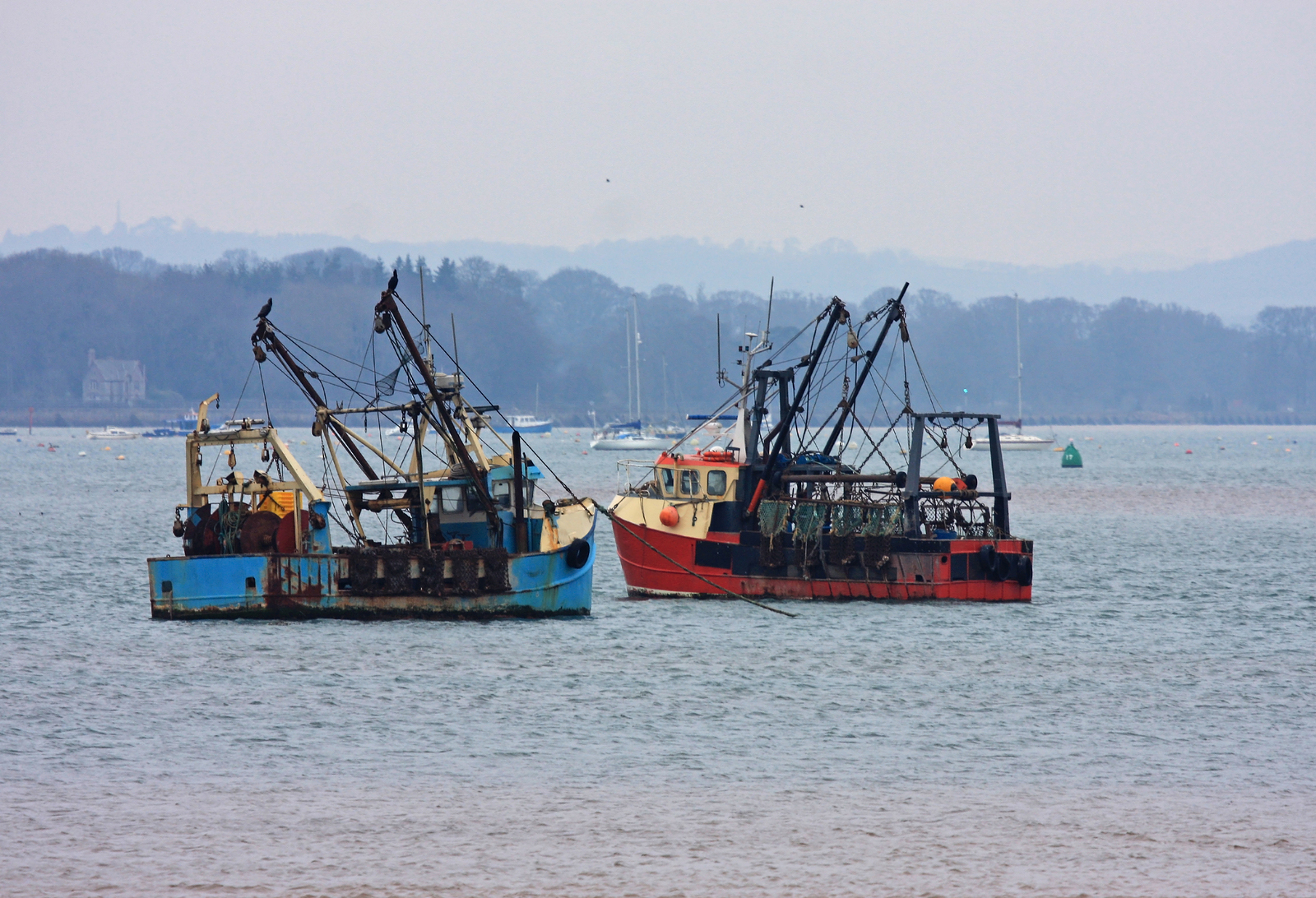
Trawler fishing boats (Photo: Bigstockphoto)
We hear a great deal about the nutritional value of fish, but it seems to be getting increasingly difficult to eat seafood sustainably. This dilemma is the subject of a book called The Perfect Protein. The author, Andy Sharpless, is the CEO of the advocacy organization Oceana and joins host Steve Curwood to discuss how we can better manage our fisheries to feed our growing population.
Transcript
CURWOOD: Fish have long been hailed for their remarkable nutritional value, and you may be old enough to have been forced to swallow cod liver oil as your mother told you it was “brain food.” And today doctors say that switching from red meat to seafood can lower the risk of heart disease and cancer in humans. Andy Sharpless, the CEO of the marine advocacy organization Oceana thinks that our fondness for fish may have an evolutionary explanation.
SHARPLESS: It would stand to reason that since our bodies are so tuned up for fish, that they’re so good for us, that there must have been some time in our evolutionary history when we ate a lot of fish. People do speculate that maybe one of the advantages that our ancestors gave us is that they were amongst the first primates to figure this out, and get to the big buffet that is the seashore.
CURWOOD: Seems though, we've overdone it at that big buffet, and though we may be suited to seafood, it’s increasingly difficult to eat fish sustainably. Still, writing in his new book The Perfect Protein, Andy Sharpless argues that we can protect this healthy food and feed our growing population - if only we manage our fisheries better.
SHARPLESS: The problem we have is that is we love them so much that we have, in a very short-sighted way, depleted the ocean bank account, so that the interest, if you will, that an abundant ocean could provide is no longer big enough to feed the mouths that want to eat it. And that’s been driven to a large part by bigger and more industrial scale fishing - those have been the real culprits. Really big boats applying very advanced technology in a very short-sighted and very aggressive fishing practice, and the people responsible are both the government managers who should be setting the rules to keep this resource abundant, and, of course, the bigger fleet operators who have been pushing hard for that.
CURWOOD: You say fish is really good for us and we ought to have it, but we’re eating too much of it. I mean, maybe we should be just giving up on fish.
SHARPLESS: Well, I am of the opposite view. I think that what we have is a very good opportunity to increase the productivity of the ocean by better management, to do so relatively quickly within five or 10 years, if you will stop overfishing, you can rebuild the bank account in the ocean, you can see, therefore, a sustainable level of return each year. In fact, scientific estimates are that if a relatively short list of countries would do a good job of managing their oceans, we could see an improvement on the order of 20 to maybe even 40 percent in the total world catch from the previous peak in the late 1980s and have that available for people to eat forever. That’s what good management could produce and do so well in time to have it available for 2050 - when we’ll have another two Chinas worth of people living on the planet.
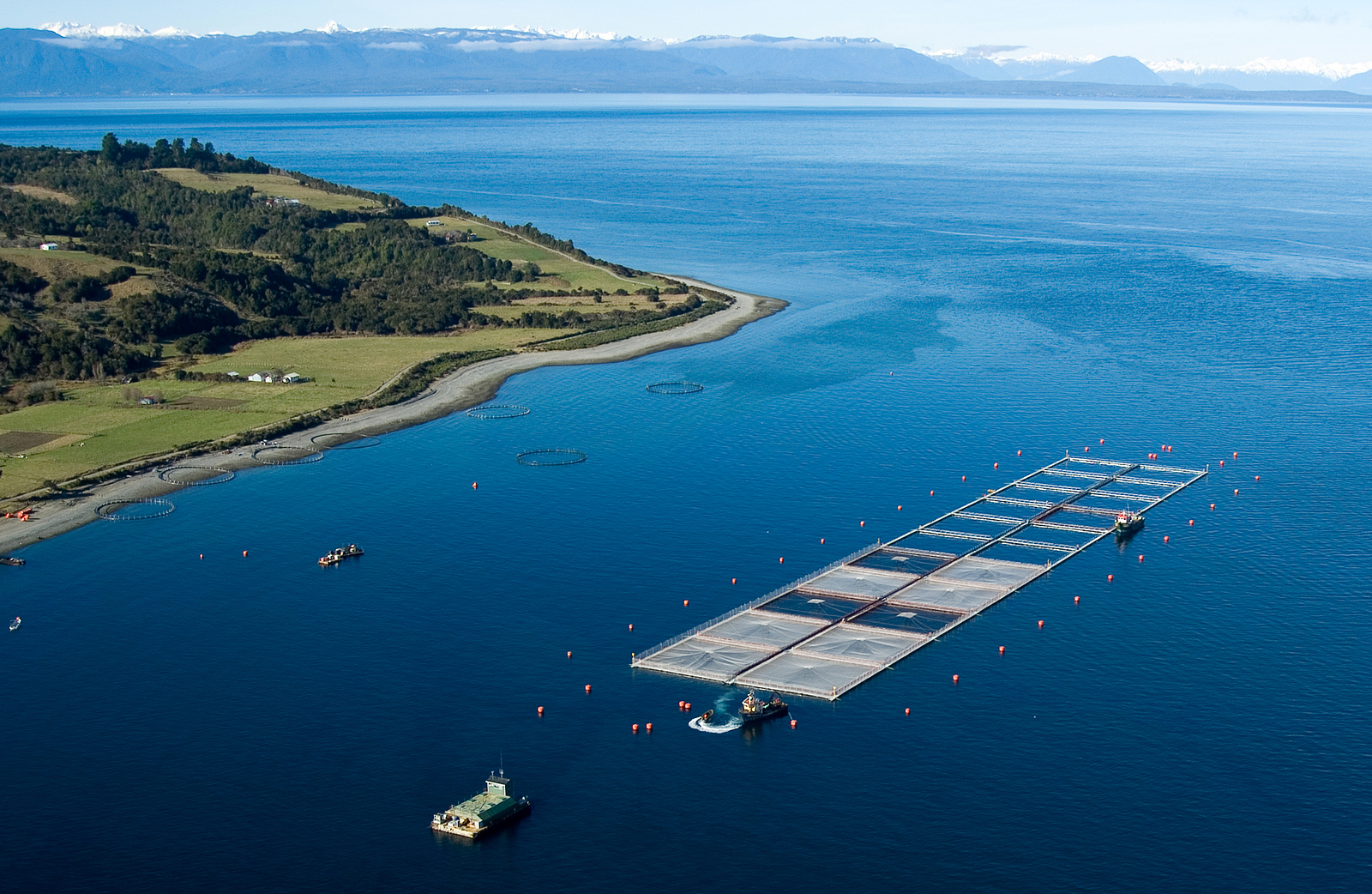
Salmon farming in Chile (Photo: Bigstockphoto)
CURWOOD: What are your rules for managing fisheries? I think you have three.
SHARPLESS: Yes. Set and enforce scientific quotas. Protect the nursery habitat, the areas that small fish need to be able to grow up and not be eaten before they get to reproduction age; protect them from being destroyed by fishing gear that drags along the bottom. And lastly, manage the accidental killing of non-target species that’s called bycatch. If you will do those three things, you will increase ocean abundance. You will increase spawning stock, and you will have more fish. And typically, you will get that in a five or 10 year period.
CURWOOD: And by the way, how’s the United States doing with that vision that you have?
SHARPLESS: We are, I’m happy to report, one of the better managed oceans in the world. In 1995, in an act of bipartisanship that used to be possible in our country, President Clinton signed a bill that was sponsored by Senator Stevens, a leading Republican senator from Alaska, which tightened the rules on fishing in American waters. And essentially what it did was, it said to the regulators in Washington, you need to set scientific quotas, you must protect nursery habitat, and you must manage what’s called bycatch. In essence, you’ve got to stop overfishing. You’ve got to let the ocean bank account build up. And our oceans are improving. The Pacific in particular has been relatively well-managed. We are the fourth largest ocean country measured by the size of our catch. And we are now able to say, to hold up our heads reasonably high in the world and say, look, we’re showing you how this can done well, and we’re managing our fisheries well.
CURWOOD: Talk to me a bit about the state of fish farming, and how much of a solution to the problem it might be to depleted fisheries.
SHARPLESS: Yes, fish farming seems intuitively, doesn’t it, like it should be a part of a solution. I mean if you’re eating a farmed fish, after all, you’re not eating a wild fish. And if wild fisheries need some space to rebuild; let’s all go eat farmed fish. That’s an intuitive, but in some cases wrong logic. Here’s what you need to know when you’re thinking about eating a farmed fish. You need to ask yourself, “what did this farmed fish eat?” And the answer to that question creates three categories of farmed fish - good, bad or indifferent. The “bad” category is if the farmed fish that you’re eating eats fish, if it’s a carnivore. And what would be a common example of that that lots of people eat? Salmon. Salmon is a carnivore. It gets fed in its pens by the farmers wild fish that have been ground up into little pellets. I’ve been to see them in Chile in these ocean pens, they get fed what looks like dog food, they kind of smell like fish. And in the process, they convert four, five pounds of wild fish into one pound of farmed fish. And so it’s a reduction activity. Now at the other end of fish farming, there are farmers farming shellfish: mussels, clams, oysters. And this is something about which we are extremely enthusiastic, and people ought to eat as much of those good-tasting things as they can stomach because think about how they grow. They grow by filtering the water. They are eating algae that they are filtering out of the water. They are eating something that we don’t want to eat. And even better in some ways, an oyster farmer is that rarest of things in the world, he is a profit-making or she is a profit-making enterprise providing jobs who wants, indeed must have, a clean ocean, and, therefore is an ally in the battle against pollution.
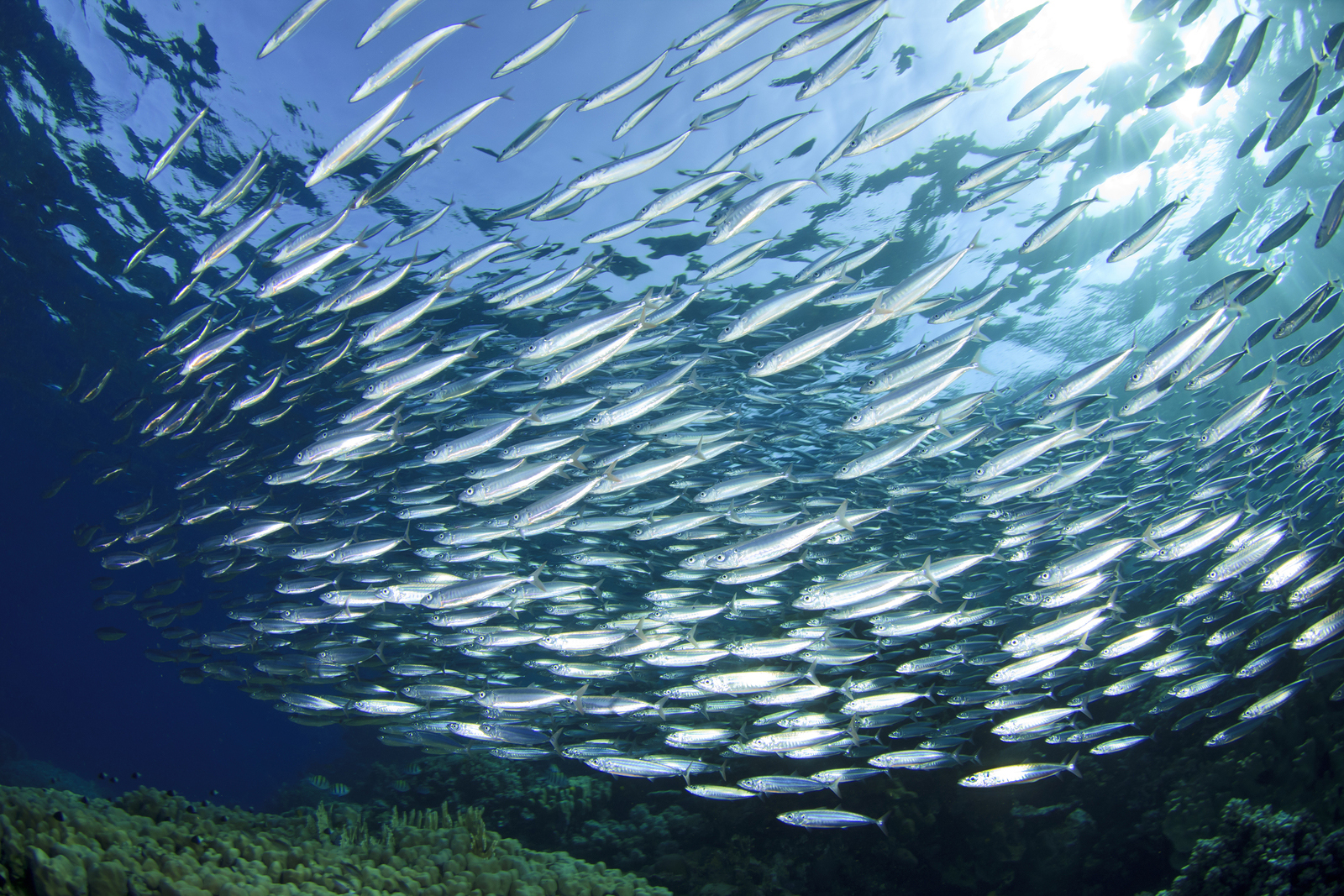
A school of sardines, one of the fishes Andy Sharpless recommends eating more of (Photo: Bigstockphoto)
CURWOOD: So, tell me, as a society, which fish should be eating more of, and which ones should we be eating less of?
SHARPLESS: So we’d like to suggest four, or depending on how you count it, five, simple rules. Eat wild; eat smaller species; eat local or domestic; eat all the farmed shellfish I mentioned - oyster, clams, mussels - that you can; and I’m sorry to say, you’ve got to swear off shrimp.
CURWOOD: Shrimp?
SHARPLESS: Yes, it’s bad news, I’m sorry. There’s no way to get a shrimp and feel good about what you’re doing for the future. Wild shrimp are caught in a process that produces very high levels of what’s called bycatch. And farmed shrimp are farmed in shallow pens typically in tropical countries that are often managed in a very short-sighted way and end up wrecking and contaminating coastal zones. It’s not a pleasant picture to go to Belize where I’ve been and see ocean coastal zones once the shrimp farmers have been through them.
CURWOOD: Now your book seems to present a bit of a conundrum. On the one hand it seems to be advocating saving fish so we can eat more of them. I mean, how fair is that safe to say?
SHARPLESS: Yes, I think that’s a wonderful and provocative summary of my message, and I agree with that. I am saying that. And it does seem kind of counterintuitive. And the reason it does is that ocean fish are the last wild animal that we eat a lot of - all over the world. And because most of what we eat is farmed, we have developed a different relationship to it. But the logic of saving these fish so that we can eat them is no more unfamiliar than the logic one brings to saving money in a bank account or investing in the stock market. We do that because we want the interest, or we want the dividends so that we can spend it. We don’t save our money without the idea of someday spending it - or spending the interest and dividends on it. And that’s the logic that we’re bringing to the moment we’re in on the oceans.
CURWOOD: Andy, what gives you hope? Give me some examples of people who are working to sustainably manage fisheries in the way that you say we should.
SHARPLESS: Well, you can go to the Norwegian cod, which was very badly managed by the Norwegians over 40 years, from the mid-1940s up until 1980s. They finally got around to putting discard bans and the fish came back dramatically in five or 10 years. The New Zealanders had a Rock lobster mismanagement problem, put fishing limits on - again in the ’80s - that fishery has rebounded. The Norwegian herring, the US haddock, which we mismanaged for 30, 40 years, from ’65 we punished this and drove it down until very low levels in the early 1990s, put fishing limits on, and it has now very strongly rebounded back to almost its original levels as spawning biomass. One of the wonderful things about fish is they are an incredibly powerful and robust part of nature. If we will give them a little bit of room, they will rebound. And you don’t have to wait 100 years for the rainforest to grow back. You can in our lifetimes, go back - plan to go back out into the ocean and see that there’s more fish out there, that we can raise our catch levels, that we can give people more jobs, and that people can eat a lot of this healthy and wonderful protein.
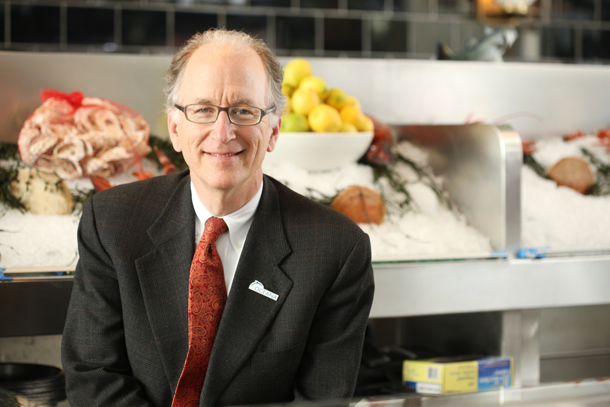
Andy Sharpless is the CEO of Oceana and author of The Perfect Protein. (Photo: Oceana)
CURWOOD: The end of your book is filled with sustainable seafood recipes. Why did you include this section in your book?
SHARPLESS: Well, you know, we really wanted it to be clear that we believe that people should eat seafood. And so we asked ourselves, how do we make that totally unambiguously clear in the book, that this is a conservationist book that is promoting seafood consumption? Putting recipes in was good for that dimension. Also frankly, if you talk to people about the category called ‘food’, you get a lot more attention than if you talk to people about the category called ‘these creatures that live on the planet with us’. So we wanted this book to have as big an audience as possible. And so we wanted to make clear to all the people that love food, this is a book that would appeal to them. One of the nice things about this moment, this kind of a “foodie” moment that we live in is that there’s some wind at our back. And part of the message of the book is to encourage people to eat things like sardines that people may not be so familiar eating.
CURWOOD: You know, I have to confess, there’s some small fish that I like, but I’m not a big fan of anchovies.
SHARPLESS: [LAUGHS]
CURWOOD: Have you got a great anchovy recipe?
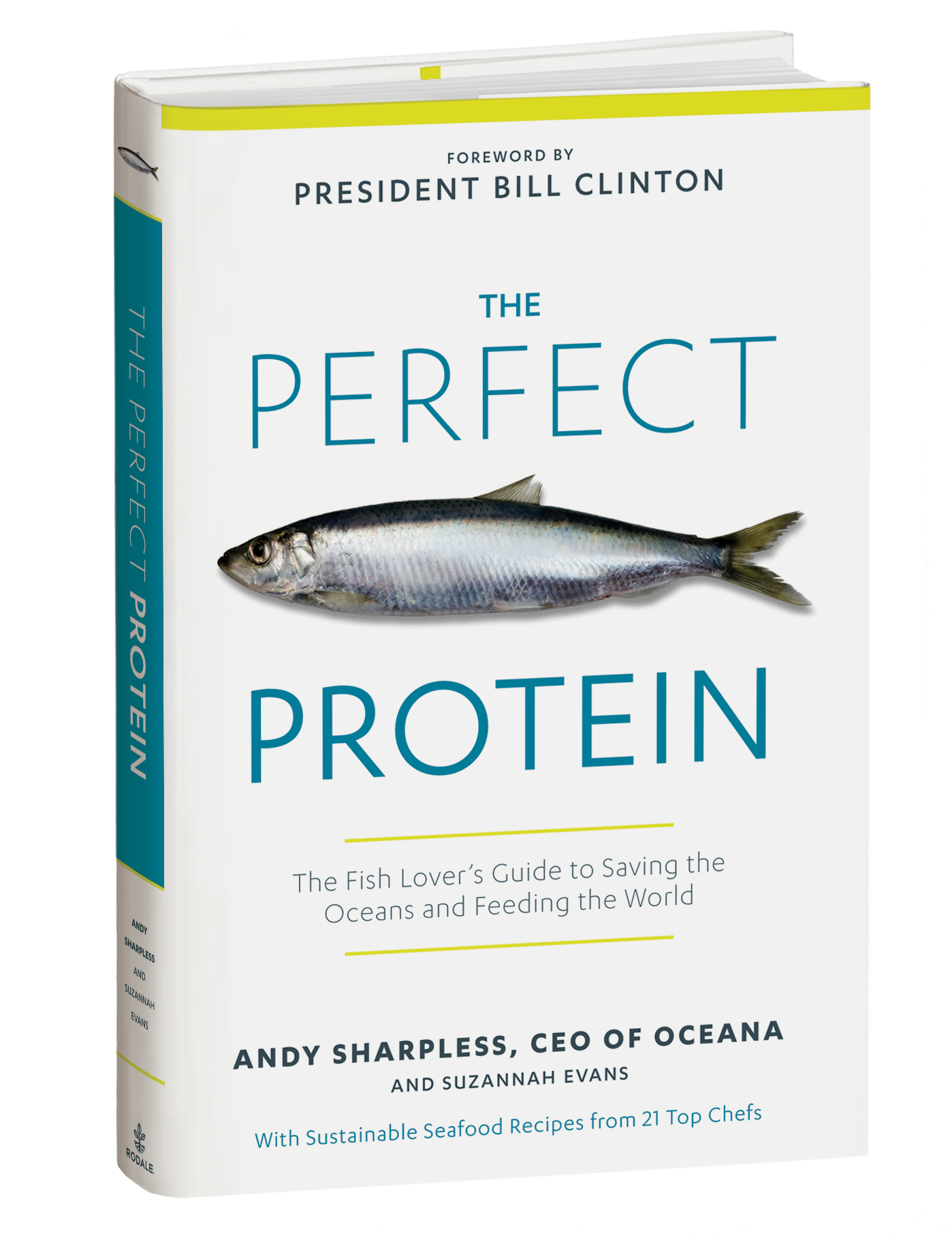
The Perfect Protein (Photo: Oceana)
SHARPLESS: There is. There’s a great anchovy recipe in here by Hugh Fearnley Whittingstall who's a British chef. Yes, I encourage people to get the book, Perfect Protein, and go to the anchovy recipe and give it a try.
CURWOOD: Andy Sharpless is the CEO of environmental non-profit Oceana, and author of the new book, The Perfect Protein. Thanks for joining us, Andy.
SHARPLESS: My pleasure.
Links
Living on Earth wants to hear from you!
Living on Earth
62 Calef Highway, Suite 212
Lee, NH 03861
Telephone: 617-287-4121
E-mail: comments@loe.org
Newsletter [Click here]
Donate to Living on Earth!
Living on Earth is an independent media program and relies entirely on contributions from listeners and institutions supporting public service. Please donate now to preserve an independent environmental voice.
NewsletterLiving on Earth offers a weekly delivery of the show's rundown to your mailbox. Sign up for our newsletter today!
 Sailors For The Sea: Be the change you want to sea.
Sailors For The Sea: Be the change you want to sea.
 The Grantham Foundation for the Protection of the Environment: Committed to protecting and improving the health of the global environment.
The Grantham Foundation for the Protection of the Environment: Committed to protecting and improving the health of the global environment.
 Contribute to Living on Earth and receive, as our gift to you, an archival print of one of Mark Seth Lender's extraordinary wildlife photographs. Follow the link to see Mark's current collection of photographs.
Contribute to Living on Earth and receive, as our gift to you, an archival print of one of Mark Seth Lender's extraordinary wildlife photographs. Follow the link to see Mark's current collection of photographs.
 Buy a signed copy of Mark Seth Lender's book Smeagull the Seagull & support Living on Earth
Buy a signed copy of Mark Seth Lender's book Smeagull the Seagull & support Living on Earth

